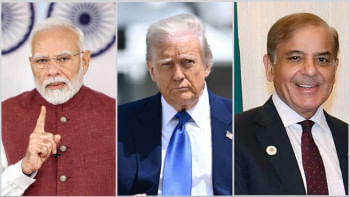Retain trade benefit for graduating LDCs
The developed and developing countries should retain the same trade privileges for the least developed countries (LDCs) even after they graduate as the coronavirus pandemic has hit poor nations hard, officials said yesterday.
Sixteen countries are set to leave the LDC group in the next decade, thanks to their better economic performance. Of them, 10 are from Asia and the Pacific.
However, the economies of the graduating countries have been hit hard more compared to the developing and developed ones for their over-dependence on a single or very few export items.
"The extension [of duty benefits] should be at least 12 years instead of three to five years," said Zuena Aziz, chief coordinator for Sustainable Development Goals Affairs at the Prime Minister's Office of Bangladesh, at a webinar.
Narayan Raj Poudel, programme director of the National Planning Commission of Nepal, echoed Aziz.
"The continuation of the international support measures (ISMs) is vital for the revival of the LDCs even if they become eligible for graduation as the pandemic has affected their economies," said Poudel.
Bangladesh organised the virtual discussion on the sidelines of the 77th Commission Session of the United Nations Economic and Social Commission for Asia and the Pacific (UNESCAP).
While presenting a keynote paper on "Sustainable Graduation in the Challenging Time: Perspectives from Bangladesh and the region", Aziz called for ensuring Covid-19 vaccines at an affordable price for all the people in the world, reducing inequality and managing climate changes for sustainable graduation.
She demanded the developed and developing countries provide easy access to finance and generous financing to the graduating LDCs in the areas of infrastructure development, fiscal spaces, health, education and the environment.
Aziz called for debt cancellation instead of debt suspension.
The export destination of some imminent graduating countries such as Bangladesh, Nepal and Cambodia is the same single market, the European Union.
The shipment from Bangladesh, scheduled to graduate from the LDC to a developing country by 2026, is reliant on the garment industry, which contributes 84 per cent to the national exports.
Bangladesh's 60 per cent export is destined to the EU. It is 50 per cent for Nepal and 45 per cent for Cambodia.
Bangladesh is one of the worst-affected economies of the pandemic as the crisis has wiped out millions of jobs and cut exports of goods.
According to the World Trade Organisation (WTO), 10 per cent export of the LDCs has been impacted by the fallouts of Covid-19.
Fatima Yasmin, secretary of the Economic Relations Division of Bangladesh, sought supports for the LDCs during the graduation period and after the graduation, and vaccines for the countries at an affordable price, access to finance for climate change, and migration at reduced costs.
Kim Veara, deputy secretary-general of the National Committee for ESCAP in Cambodia, said in the pre-pandemic period, his country's annual rate of poverty reduction was 1.5 per cent, but the fallouts of the pandemic had created new poor.
Cambodia, a garment exporting nation, fell in trouble because of Covid-19, he said.
He sought continuation of the ISMs and official development assistance from the developing and developed countries to revive the economy.
Cambodia is set to move out of the LDC group in 2021.
Armida Salsiah Alisjahbana, under-secretary-general of the UN and executive secretary of the ESCAP, said only the duty-free and quota-free market access of goods of the LDCs to the developing and developed countries was not adequate.
"They need more."
Federico Bonaglia, deputy director of the OECD Development Centre of the Organisation for Economic Co-operation and Development, called on world leaders to invest in vaccination to save the lives of people.
"The inaction in vaccination will cost trillions of dollars," he warned.
Taffere Tesfachew, a member of the UN Committee for Development Policy, which assesses the graduation criteria, said Bangladesh had set an example as this was the only country that could fulfil all three criteria strongly at one go.
"Bangladesh is a role model in the world for its effective utilisation of ISMs," he said.
Taufiqur Rahman, head of the LDC Unit of the Development Division of the WTO, said 10.3 per cent trade of the LDCs was affected because of the pandemic, which had created barriers for the graduation of many LDCs.
The LDCs demanded an extension of the duty privilege for 12 years, and they have to negotiate seriously to achieve that, he said.
Mohammed Abdul Hye, permanent representative of Bangladesh to the ESCAP, and Md Abdul Alim, senior economic affairs officer of the LDC Unit of the UN Office of the High Representative for the Least Developed Countries, Landlocked Developing Countries and Small Island Developing States, also spoke.
Nagesh Kumar, head of the South and South-West Asia office of the ESCAP, moderated the webinar.

 For all latest news, follow The Daily Star's Google News channel.
For all latest news, follow The Daily Star's Google News channel. 



Comments